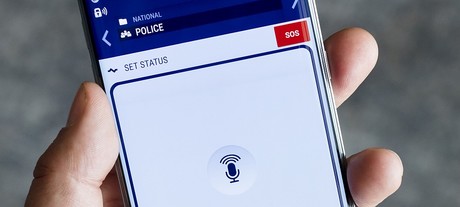Smartphone app provides flexible comms

A smart app is keeping communications flowing for Bulgarian Border Police officers, whichever device they use.
The detention of 23 people illegally transported over the border from Greece in a lorry and the seizure of more than 300,000 smuggled cigarettes have been among the most notable recent successes for Bulgaria’s Border Police. Effective communications is key to successes such as these.
Charged with policing the country’s borders with five neighbouring countries as well as a coast on the Black Sea, Bulgaria’s Border Police faces many challenges. The country’s security services faced an additional workload in the first half of 2018 when Bulgaria took on the six-month rotating presidency of the European Council. The country took as its motto for the presidency “United We Stand Strong”, a phrase that could also sum up the approach of the country’s Border Police and how it is using advanced communications technology to work together more closely.
To help safeguard its borders, the Border Police needs good communications, so it uses a network owned and operated by the Ministry of Interior (MoI). The Bulgarian MoI network is based on more than 180 base stations and uses the latest Airbus Professional Mobile Radio (PMR) switching technology.
Widely used
The Border Police’s philosophy of working together is strengthened by ensuring that everyone can keep in touch through the network. Officers on the ground have their radios to coordinate operations, but what if they need support or advice from people who do not carry PMR devices?
Many people in any organisation will use smartphones. However, if this is their only device, they can be cut off from the operational side of things. There is a clear need to make smartphones more connected to the professional mobile radio network used in the field. This need is met with Tactilon Agnet, an app that lets smartphone users contact Border Police PMR talk groups at the touch of a button. With Tactilon Agnet, smartphone users can talk to users who carry a PMR radio and also with the control room. Voice, SMS and location services can all be used.
Bulgaria is making good use of the app, with the Border Police employing it since 2017. A wide range of users, from executives to employees from different structures within the MoI, are using smartphones loaded with the app.

Staying in the loop
Tactilon Agnet has been used in Bulgaria for both individual and group calls. Calls are made to and from Agnet, from Agnet to PMR and from Agnet to a PABX. PMR radios are the main communication method, with Agnet-equipped smartphones used as a back-up, particularly for special events and special circumstances where smartphone users need to be kept in the loop.
Used with 3G/4G/5G networks and Wi-Fi, the app is versatile and easy to learn — in Bulgaria’s experience, users have needed no special training to immediately start using the app and benefit from its features.
Those users have also reported that the app’s interface is very user friendly and they have had no issues or problems using it so far. It has also been used on a wide range of smartphone models and there are plans to use it on iPhones in the future.
Similar experiences have been reported by users in Estonia. Military users in the National Defence League found that with good LTE coverage, the combined use of PMR and LTE is useful. Users gave plenty of positive feedback about the messaging functionality of the app, which they felt was very easy to use and helpful.
A world of difference
Unlike commercially available apps that claim to turn a smartphone into a two-way radio, Tactilon Agnet is built with mission-critical professional use in mind. Vital capabilities it brings include the ability to talk to groups, as well as enabling individual or one-to-one calls. This removes the need to close the app and make a phone call.
It also enables the user to keep their place in a queue if they cannot speak straight away because someone else is speaking. Even more important is the app’s emergency call capability.
A user in a dangerous situation can make an emergency call to get help very quickly, while not wasting resources by allowing one to be made accidentally. The app also automatically sends the call to the right place and, if the first choice of recipient doesn’t answer, the call is sent automatically to someone else.
Smartphone users may not always be on the frontline, but when they need to keep in touch with operational events, the right app can make a world of difference.
Please follow us and share on Twitter and Facebook. You can also subscribe for FREE to our weekly newsletter and bimonthly magazine.
Why P25 technology remains a good fit for public safety communications
Digital LMR technology ensures police officers, firefighters and emergency management teams can...
From past to present: leveraging satellite data for better disaster resilience
Whether monitoring flood-prone regions or assessing wildfire-prone landscapes, historical...
Lancashire Police adds in-car video to full vehicle fleet
Motorola Solutions' M500 in-car video solution observes a vehicle's environment from...





